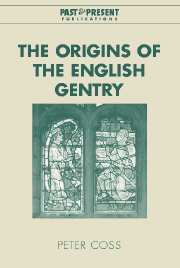Book contents
- Frontmatter
- Contents
- List of illustrations
- Preface
- 1 The formation of the English gentry
- 2 The roots of the English gentry
- 3 The Angevin legacy: knights as jurors and as agents of the state in the reign of Henry III
- 4 The crisis of the knightly class revisited
- 5 Knights in politics: minor landowners and the state in the reign of Henry III
- 6 Knighthood, justice and the early Edwardian polity
- 7 The explosion of commissions and its consequences
- 8 Identity and the gentry
- 9 Knights, esquires and the origins of social gradation in England
- 10 Crystallisation: the emergence of the gentry
- Appendices
- Bibliography
- Index
- Past and Present Publications
8 - Identity and the gentry
Published online by Cambridge University Press: 10 December 2009
- Frontmatter
- Contents
- List of illustrations
- Preface
- 1 The formation of the English gentry
- 2 The roots of the English gentry
- 3 The Angevin legacy: knights as jurors and as agents of the state in the reign of Henry III
- 4 The crisis of the knightly class revisited
- 5 Knights in politics: minor landowners and the state in the reign of Henry III
- 6 Knighthood, justice and the early Edwardian polity
- 7 The explosion of commissions and its consequences
- 8 Identity and the gentry
- 9 Knights, esquires and the origins of social gradation in England
- 10 Crystallisation: the emergence of the gentry
- Appendices
- Bibliography
- Index
- Past and Present Publications
Summary
Central to the formation of the gentry, I have argued, is a developed sense of territorial identity: a collective identity which both involved the expression of shared interests and led to the development of status gradations. The county was crucial to the process, and its role was considerably enhanced when it came to interact with the Commons in parliament. As the Commons emerged as a real political force during the 1320s and 1330s, so the county's capacity to articulate local interests was correspondingly strengthened.
This argument may be thought, at least at first sight, to be moving against the grain of recent studies. The notion of the shire as the embodiment of social cohesion in the localities has taken something of a hammering of late. Robert Palmer's powerful and influential study of the county court has shown how it was dominated, most notably by the reign of Edward I, by lawyers who were often also the stewards and bailiffs of lords. These were the men who were largely responsible for the judgements of the courts, and who ‘made the county court a professional and legally respectable institution, rather than the amateur court presented by historians’. Looking at the early thirteenth century I have suggested that local society operated at some remove from the county court, and that most knights avoided its detailed business except when specifically called upon.
- Type
- Chapter
- Information
- The Origins of the English Gentry , pp. 202 - 215Publisher: Cambridge University PressPrint publication year: 2003



